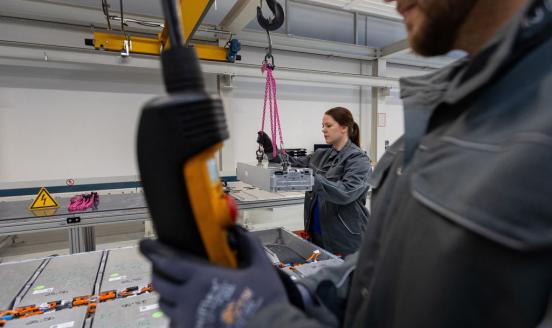Understanding barriers and resistance to training in the European Union
People with less education are also less able and willing to participate in training; understanding why is essential to prevent a widening skill gap.

Companies face a huge gap between the skills they need to prosper in the changing economy and the skills available in the labour market. Nearly three-quarters of executives say that changing the skill composition of the workforce is their top priority for dealing with future disruptions, but only 17% believe that their employees are ready for such changes. Overall, about 40% of workers need to learn new skills to accommodate the changes in skill demand, according to 2020 estimates.
There is therefore a significant need for worker training. In the European Union, training uptake has been increasing steadily, but is still considerably below the target for 60% of the adult population to participate in training each year by 2030. In most EU countries, less than half the adult population participates in training; rates vary between 25% and 50% ( Figure 1). Romania has the lowest participation rate, with only 7% of the adult population aged 25 to 64 participating in formal or non-formal education and training. Only the Netherlands with a rate of 64.1% and Sweden (63.8%) meet the 2030 target.
Most (88.5%) of the workers who participate in training in Europe do so in non-formal contexts – in other words classes or workplace training without a formal syllabus or official accreditation (as opposed to formal learning, which is structured and accredited and leads to recognised qualifications). Most (83.6%) of this non-formal training is job-related, with employers sponsoring 87.9% of non-formal job-related training.
The relatively low uptake of training is worrying in particular because it hits disadvantaged workers disproportionally hard. The most vulnerable get the least training, which threatens to widen socio-economic inequalities. To address this, a better understanding is required of the barriers that prevent people from getting the training they need.
Different barriers in different countries
Time and financial constraints are the two main barriers that stop people from participating in training (Figure 2). On average, 40.7% of adults say that their schedules prevent them from participating; among EU countries, this proportion is highest in Malta (67.8%). On average, 32.2% of adults say cost is a barrier, with Greece having the highest prevalence (46.9%). Family reasons are given as the third most common barrier (on average 31.6%), with the highest percentages observed in Cyprus (58.1%) and Malta (56%). Data comes from the 2016 EU Adult Education Survey, which is carried out intermittently and will next be published in 2024 (covering 2022-2023 data).
The barriers to training vary to some extent across demographic groups. Women are more likely to cite family reasons as preventing them from participating in training, while health and age are the main reasons given by older people. The low-educated state disproportionally that ‘other reasons’ prevent them from taking up training (Figure 3).
‘Other reasons’ is a category that groups together a range of reasons, including ‘not meeting prerequisites of the training’, ‘not having access to internet or computers’ and ‘having negative previous learning experience’. While this grouped category might be less significant for some demographic groups, for those with low education levels, ‘other reasons’ are highly relevant. Figure 4 shows the percentage of low-educated adults who state ‘other reasons’ for not participating as a share of total involuntary non-participation. On average, one out of three low-educated adults who wanted to participate in training but couldn’t cited ‘other reasons’ as the main obstacle. In some countries, ‘other reasons’ for being unable to participate in training were given by more than half of low-skilled people (54% in Bulgaria; 52% in Germany). In Greece, Hungary, Romania, France, Austria, Sweden, Spain, Belgium and Finland, the ‘other reasons’ rate was above 30%. Unfortunately, for a number of countries (Croatia, Czechia, Denmark, Estonia, the Netherlands, Poland, Slovakia and Slovenia), the educational breakdown was not collected so we do not know what specific barriers low-educated workers face.
‘Other personal reasons’ is a residual category that is not broken down further. Nevertheless, this category is quite significant in some countries. In Czechia almost half, and in Greece and Germany one third, of people who were unable to participate in training argued that ‘other personal reasons’ hindered their participation. In Germany, the prevalence of other reasons was as high as 53.8% among low-educated people.
Health reasons also prevent disproportionately people with low education levels from taking up training. This could be a purely arithmetic result if older generations have lower educational attainment levels, as would be expected. However, it can also be driven by lower income leading to poor health outcomes. Publicly available aggregated data does not enable further investigation of this issue.
Low uptake of training by low-educated people and lack of understanding of the main barriers they face jeopardise the success of any future reskilling and upskilling effort for a group comprising 54 million people, or 23% of the EU working age population.
Limited willingness to train
Another important aspect of the challenges facing adult learning is the willingness of workers to engage in training. Regardless of the barriers, the main reason for not participating in training remains lack of interest. Across all EU countries and demographic groups, the majority of people who did not participate in training stated that they didn’t want to. Training unwillingness is lowest in Cyprus (47.1%), but even there, almost half of the people not in training do not want to train. Similarly, in 10 other countries, more than four out of five people reported that they didn’t want to engage in training.
The breakdown of unwillingness to train by educational level (Figure 5) shows that in almost all countries, unwillingness is highest among the low-educated. Unwillingness is therefore a bigger reason for not participating in training than the barriers discussed above. On average, only 18% of low-educated people were prevented from training by those barriers.
Most survey participants do not want to engage in training because they see no need to do so (Figure 6). The rate of people perceiving no need for training ranges from 30% in Greece to almost 90% in Bulgaria. Even in Cyprus, where there was a strong demand for training, those who didn’t want to participate mostly argued that they have no need. This belief among workers in the lack of any need for training contrasts with the beliefs of employers, which we highlighted at the beginning. Survey data therefore suggests that people are not fully aware of the urgency of up- and reskilling, or do not apply it to their own situations.
Understanding the psychological and social barriers
The lack of interest and relatively limited participation in training, especially among the low-educated, is well-established. Past policy recommendations have focused on clarifying the benefits of learning through information provision, and on removing structural impediments to acquiring the returns to training, either through “the recognition of prior learning, adequate certification of skills, the provision of useful course content and better information and guidance on learning opportunities”.
Current EU initiatives to improve lifelong learning attempt mainly to overcome economic barriers to training. For example, Individual Learning Accounts address the credit constraint issue, while Microcredentials enable accreditation for non-formal training. Public employment services tackle the information problem by making information about job vacancies more available to job seekers. Interesting private initiatives, such as Jobflix and BobEmploi in France, also attempt to link information about employment opportunities to information about training opportunities. All of these – credit constraints, the lack of recognition of prior learning , information asymmetries – are well-recognised in the economic literature as labour-market failures.
But these economic factors might not be the most important reasons why the low-educated don’t want or are unable to train. Nurturing a lifelong learning culture among citizens and workers requires an understanding of the psychological, social and institutional barriers to training, which appear to be less-well understood by policymakers. Individual attitudes, beliefs and social circumstances influence the willingness and ability to train. People adapt their goals and aspirations to opportunities in their environment, and to the norms of peers in their social group. Negative learning experiences at school, or on-the-job learned helplessness, makes people believe they are not capable of learning no matter what they try. Segmented labour markets further drive wedges between low-paid, low-training, low-security jobs, and high-paid, high training, high-security jobs.
These psychological, social and institutional reasons for not wanting or being unable to train are especially significant for low-educated workers. It is therefore worrying that their needs are not well-understood nor well-captured by current surveys. As long as surveys fail to adequately capture the social and psychological barriers faced by the low-educated, it will be difficult to design targeted policies. Moreover, the mechanisms through which these barriers restrict training are diverse and sometimes counteract one another, requiring tailored interventions. This year is the European Year of Skills. Policymakers must better understand the psychological and social barriers that workers face in terms of their willingness and ability to take up training in order to make it a success.



